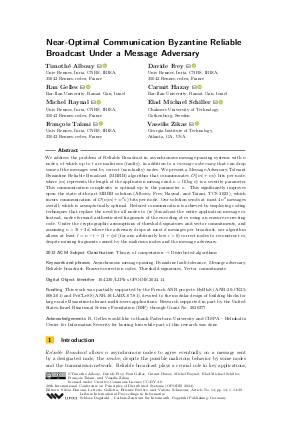LIPIcs.OPODIS.2024.14.pdf
- Filesize: 1.11 MB
- 29 pages

 Creative Commons Attribution 4.0 International license
Creative Commons Attribution 4.0 International license

We address the problem of Reliable Broadcast in asynchronous message-passing systems with n nodes, of which up to t are malicious (faulty), in addition to a message adversary that can drop some of the messages sent by correct (non-faulty) nodes. We present a Message-Adversary-Tolerant Byzantine Reliable Broadcast (MBRB) algorithm that communicates O(|m|+nκ) bits per node, where |m| represents the length of the application message and κ = Ω(log n) is a security parameter. This communication complexity is optimal up to the parameter κ. This significantly improves upon the state-of-the-art MBRB solution (Albouy, Frey, Raynal, and Taïani, TCS 2023), which incurs communication of O(n|m|+n²κ) bits per node. Our solution sends at most 4n² messages overall, which is asymptotically optimal. Reduced communication is achieved by employing coding techniques that replace the need for all nodes to (re-)broadcast the entire application message m. Instead, nodes forward authenticated fragments of the encoding of m using an erasure-correcting code. Under the cryptographic assumptions of threshold signatures and vector commitments, and assuming n > 3t+2d, where the adversary drops at most d messages per broadcast, our algorithm allows at least 𝓁 = n - t - (1 + ε)d (for any arbitrarily low ε > 0) correct nodes to reconstruct m, despite missing fragments caused by the malicious nodes and the message adversary.



Feedback for Dagstuhl Publishing